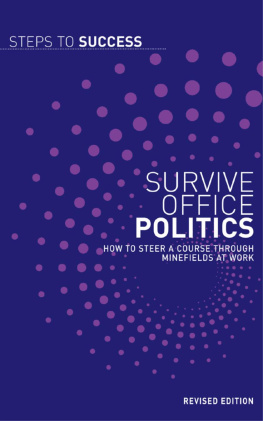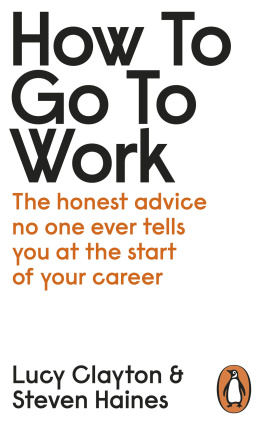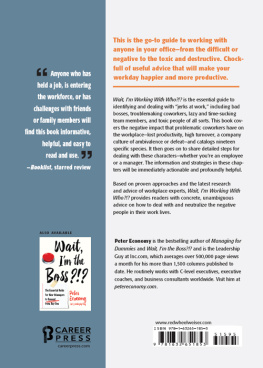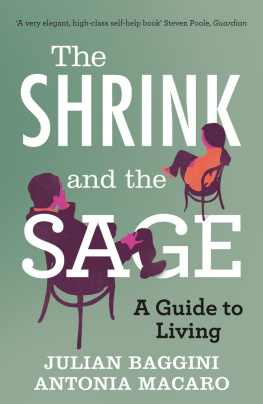THE REAL OFFICE
LUCY KELLAWAY is the management columnist at the Financial Times and is well known for her pointed commentaries on the limitations of modern corporate culture. She was named Columnist of the Year at the British Press Awards in 2006, and is the author of Sense and Nonsense in the Office and Martin Lukes: Who Moved My BlackBerry. She lives in London with her husband and four children.
THE REAL OFFICE
All the office questions you never dared to ask
LUCY KELLAWAY

First published in Great Britain in 2007 by
Profile Books Ltd
3A Exmouth House
Pine Street
London
ECIR OJH
www.profilebooks.com
Copyright Lucy Kellaway, 2007
1 3 5 7 9 10 8 6 4 2
Typeset in Plantin by MacGuru Ltd
info@macguru.org.uk
Designed by Sue Lamble
Printed in the United States of America
The moral right of the author has been asserted.
All rights reserved. Without limiting the rights under copyright reserved above, no part of this publication may be reproduced, stored or introduced into a retrieval system, or transmitted, in any form or by any means (electronic, mechanical, photocopying, recording or otherwise), without the prior written permission of both the copyright owner and the publisher of this book.
A CIP catalogue record for this book is available from the British Library.
ISBN 978 1 84668 214 8
Contents
INTRODUCTION
I always wanted to be an agony aunt. There may have been a brief period when I was about nine during which I flirted with the idea of being an air hostess instead, but by the time I was thirteen my ambition was strong and unwavering. I wanted to write a column in a magazine giving out advice to readers.
My favourite reading matter at that age was Jackie, a teen magazine all about Donny Osmond and midi-skirts. The best part was the problem page on which Cathy & Claire meted out straight-talking advice to tortured adolescents. When readers wrote in moaning about their two-timing boyfriends, Cathy & Claire would briskly tell them to stop being doormats.
As I got older I started to show promise as the sort of person that people came to for direction. Soon after I joined the Financial Times twenty years ago, my colleague Dominic Lawson (son of the former chancellor of the exchequer, he went on to edit the Spectator and the Sunday Telegraph) matter-of-factly informed me that I had a lavatory face.
This did not sound terribly nice, but then Dominic often said things that were not nice. He went on to explain that I, like his mother, had the kind of face someone coming into an office full of strangers would instinctively turn to for directions to the lavatory.
It might not have been much, but it was a start. In fact, not only did I confidently tell people the most direct route to the office loo, but as time went on I started dispensing more complicated advice too.
Eventually, at the beginning of 2006, some thirty-five years after I hatched the plan, it came to pass. My agony column started to appear on Wednesdays in the FT and since then I have handed out advice on bullying bosses, office affairs, sexism, when to wear chinos: big problems, little problems.
In dispensing workplace advice, Ive joined a crowded market. You might say there are too many peddlers of solutions already with all those executive coaches and trainers and facilitators. But most of them offer advice based on fashionable theories of management, most of which is daft. My USP is that I have no fashionable theories. I never mention comfort zones, though if I did I would never, ever recommend stepping outside one. In my experience comfort is nice, and hard to achieve. If you have managed to get comfortable, I would strongly recommend that you keep up the good work. In truth I have no theories at all, except that working life can be hard and we must muddle through as best we can.
My only qualification for handing out advice (apart from a desire to do so) is that I have worked in offices for a quarter of a century. I have written and read about the problems of office life for nearly as long (as well as experienced a good few difficulties myself) and I offer a humbug-free service, with all my answers written in a few easy-to-understand words.
A second differentiating feature is that Im not frightened of the negative. Most agony aunts and other advice providers now refer to problems as dilemmas; the word sounds less negative and, in this self-improving world, we have to be positive at all costs. By contrast, my problems are called just that problems because that is what they are, and because working life is stuffed full with them. The more negative and intractable the problem, the more satisfaction I get from thinking about it and trying to solve it.
The first thing people want to know when I say Im an agony aunt is whether the problems are real, or whether they have been whisked up by me in an idle moment. The answer is that they are all real. Though that doesnt mean that they all reach me in the conventional way. Only about half the problems in this book arrived obediently via the problems inbox (, in case you have something youd like to submit); the rest had to be winkled out.
When I first put an invitation in the FT soliciting for agony, I received a great many responses which was good. What was less good was that some readers did not understand quite what sort of problem I was after.
One man wrote asking if I could help him with off-street parking in the Essex village where he lives. The answer to this was no, I could not. Another person sent in a question about why the FT charges for access to a lot of FT.com material. I can answer this, although I do not consider it a problem as such. The reason is that the FT is a business, and therefore it is trying to make money.
In addition to these there were some pukka problems that were just what I was after. In that very first crop there was a man jaded from his job as a City lawyer and wedded to a (dotty, in my view) search for more meaningful work. There was a woman whose colleague had been convicted of downloading child porn and who, on his release from prison, had tried to get in touch with her again.
Though the problems that Im sent are plentiful, there is a snag. They dont cover the waterfront. There is no shortage of emails from people with troublesome bosses or colleagues or from middle-aged professionals finding out that working life is not quite what they hoped it would be. But nothing from bosses. Im never sent problems about the hard things senior managers have to do: firing people or promoting them or motivating them. This is sad, though not surprising. It isnt that bosses dont have problems: obviously they do. It is that unless they are slightly odd, bosses simply dont write to newspaper agony aunts begging for advice.
So I have had to be what is popularly called proactive in flushing out problems. Every time I meet anyone I start probing. I ask managers what is troubling them most at the moment (apart from the fact that a middle-aged woman with a glint in her eye is asking prying questions). If they tell me something that sounds interesting I write it up.
This has got me into difficulties in the past. I should apologise to the person who told me that his boss hit him. He seemed pleased when I said I was going to use his story as a problem, indeed he had told everyone in his office to look out for it. He was less pleased when he read the answer, in which I suggested that his male boss might fancy him. It seems I was wide of the mark or perhaps I was painfully close to the truth. Either way, it went down badly, and I apologise sincerely for any embarrassment caused.









